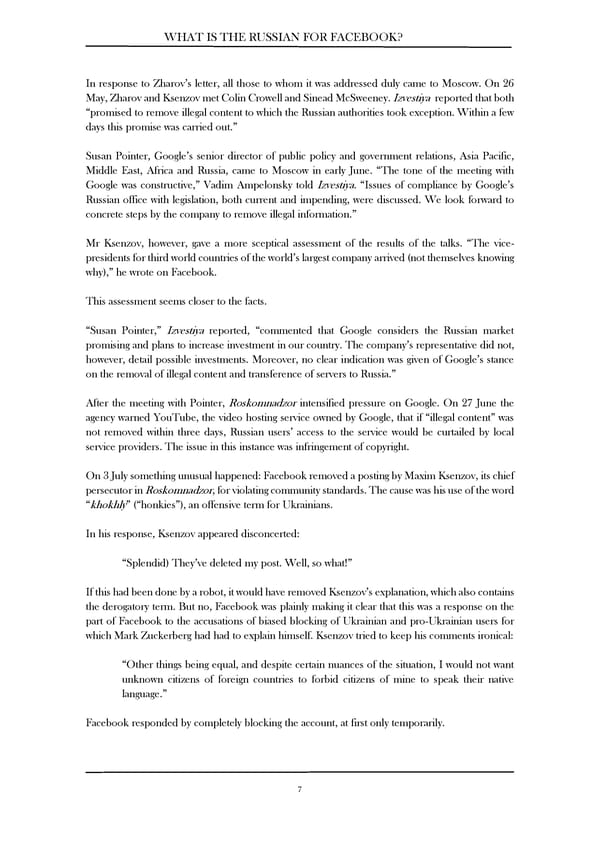WHAT IS THE RUSSIAN FOR FACEBOOK? In response to Zharov’s letter, all those to whom it was addressed duly came to Moscow. On 26 May, Zharov and Ksenzov met Colin Crowell and Sinead McSweeney. Izvestiya reported that both “promised to remove illegal content to which the Russian authorities took exception. Within a few days this promise was carried out.” Susan Pointer, Google’s senior director of public policy and government relations, Asia Pacific, Middle East, Africa and Russia, came to Moscow in early June. “The tone of the meeting with Google was constructive,” Vadim Ampelonsky told Izvestiya. “Issues of compliance by Google’s Russian office with legislation, both current and impending, were discussed. We look forward to concrete steps by the company to remove illegal information.” Mr Ksenzov, however, gave a more sceptical assessment of the results of the talks. “The vice- presidents for third world countries of the world’s largest company arrived (not themselves knowing why),” he wrote on Facebook. This assessment seems closer to the facts. “Susan Pointer,” Izvestiya reported, “commented that Google considers the Russian market promising and plans to increase investment in our country. The company’s representative did not, however, detail possible investments. Moreover, no clear indication was given of Google’s stance on the removal of illegal content and transference of servers to Russia.” After the meeting with Pointer, Roskomnadzor intensified pressure on Google. On 27 June the agency warned YouTube, the video hosting service owned by Google, that if “illegal content” was not removed within three days, Russian users’ access to the service would be curtailed by local service providers. The issue in this instance was infringement of copyright. On 3 July something unusual happened: Facebook removed a posting by Maxim Ksenzov, its chief persecutor in Roskomnadzor, for violating community standards. The cause was his use of the word “khokhly” (“honkies”), an offensive term for Ukrainians. In his response, Ksenzov appeared disconcerted: “Splendid) They’ve deleted my post. Well, so what!” If this had been done by a robot, it would have removed Ksenzov’s explanation, which also contains the derogatory term. But no, Facebook was plainly making it clear that this was a response on the part of Facebook to the accusations of biased blocking of Ukrainian and pro-Ukrainian users for which Mark Zuckerberg had had to explain himself. Ksenzov tried to keep his comments ironical: “Other things being equal, and despite certain nuances of the situation, I would not want unknown citizens of foreign countries to forbid citizens of mine to speak their native language.” Facebook responded by completely blocking the account, at first only temporarily. 7
 What is the Russian for Facebook? Page 7 Page 9
What is the Russian for Facebook? Page 7 Page 9